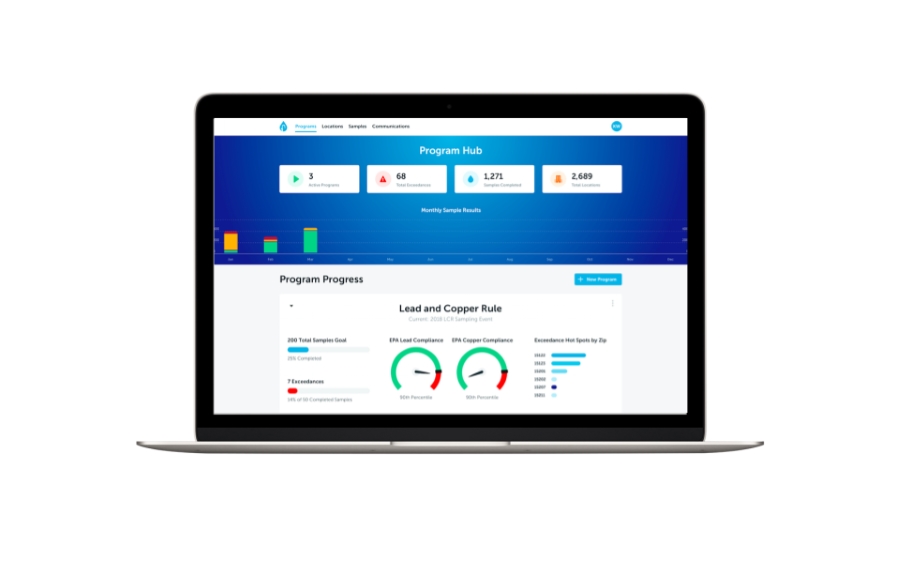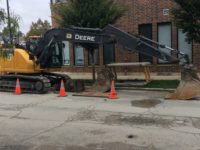Less than three months after receiving approval from the U.S. Environmental Protection Agency for a trial lead service line replacement program, Denver Water began the process of removing lead service lines from its system.
The utility estimates that 64,000 to 84,000 residences receive water through lead pipes, and it plans to replace all of these lines within 15 years at a cost of about $500 million. It’s now using a central water platform with data filtered into readable dashboards to manage the 15-year replacement project.
While Denver Water delivers lead-free water to homes and businesses, lead can enter the water as it moves through customers’ lead-containing plumbing and service lines. Any time that lead is introduced from pipes in a home, it has the potential to enter a municipal water system connected to that home.
No level of lead in drinking water is considered safe, so Denver Water wanted to move quickly to remediate lead levels when tests showed a spike in the level of lead in drinking water in 2012. The spike was found during routine water quality monitoring at homes with known lead and copper service lines. As part of the Lead and Copper Rule, Denver Water had been conducting these tests for nearly 30 years.
Colorado Department of Public Health and Environment officials ordered Denver Water to use orthophosphate to prevent the leaching of lead into water, but the utility rejected that idea. Orthophosphate could create other health risks for Denver Water customers, as well as the environment, utility officials said. Instead, Denver Water developed a plan to eradicate the source of lead in drinking water by identifying and replacing lead service lines in homes.
Since this project is expected to take 15 years, the utility planned interim steps including boosting the alkalinity of water to reduce corrosion in lead pipes, as well as a program that includes the testing of tap water and providing free water filter pitchers to affected residents. This plan was accepted by The Colorado Department of Public Health and Environment last December.
Locating the Problem
The program took shape with Denver Water mapping and creating an inventory of all homes known or suspected to have lead service lines using a combination of property records, water quality tests and visual inspections of service lines. The utility then prioritized lead service line replacement in areas with a higher population of children and young families.
In order to move quickly after EPA approval of the plan late last year, Denver Water needed a centralized way to manage the program. The utility needed a method to capture, house and interpret data from the city’s water sampling program, as well as manage the supply, distribution and correct usage of pitcher and filter kits, which the city is providing to affected residents.
Digital Water Platform
Denver Water partnered with 120Water in order to manage the lifecycle of their program and automate key aspects. As a digital water platform that consists of sample and filter kits, cloud-based software, and services used to manage and execute water programs at scale, 120Water centralizes data and delivers dashboards that show actions and results for projects such as Denver’s.
Residents with homes identified as having a possible lead service line were notified this spring. As service lines are replaced or disrupted, Denver Water is offering residents a pitcher and filter kit. 120Water’s platform will trigger the delivery of approximately 150,000 NSF 53-certified pitchers and filter kits and 1.2 million replacement filters along with clear instructions for usage. This is being done at no cost to residents over the trial’s three-year period.
A few weeks before receiving the pitcher and filter kit, the 120Water platform automates sending residents mail to introduce the program so they know the pitcher kits are coming and know why and how to use them.
The platform can automate the distribution of pitcher kits from a list or a form can be made available to residents making individual requests. It also generates voucher codes to validate submissions for pitcher kit fulfillment.
Denver Water also is using the 120Water platform to manage its water sampling program. This includes pre-lead service line water testing at about 30,000 taps. These tests require the cooperation of residents, so education and follow up are important elements that often require resources and attention. As such, the platform also automates the mailing of testing kits to affected residents, along with instructions on how residents should perform the tests and return the sample. Once analyzed by a laboratory, associated data is housed in the 120Water platform, which automates the communication of tap test results to Denver Water and residents both electronically and by mail.
The 120Water platform is also centralizing Denver’s service line inventory data, including GIS, historical paper data, customer information and demographics. The data is unified and presented in dashboards, giving utilities a full picture of lead service line replacement and the program's progress.
Measuring Success
Denver Water must replace an average of 7% of its lead service lines each year for the next three years in order to extend EPA approval for the remaining 12 years. This also includes implementing a public outreach and education program about the dangers of lead in drinking water and the progress the utility is making in reducing it.
Automating as much of the effort as possible will be key to the success of the utility's highly-complex effort.
Megan Glover is CEO of 120Water, a digital water platform. 120Water solutions are used in 180,000 locations across the United States for clients including the city of Newark, N.J., the Pittsburgh Water and Sewer Authority, Chicago's Public Schools and the Indiana Finance Authority



Post a comment to this article
Report Abusive Comment